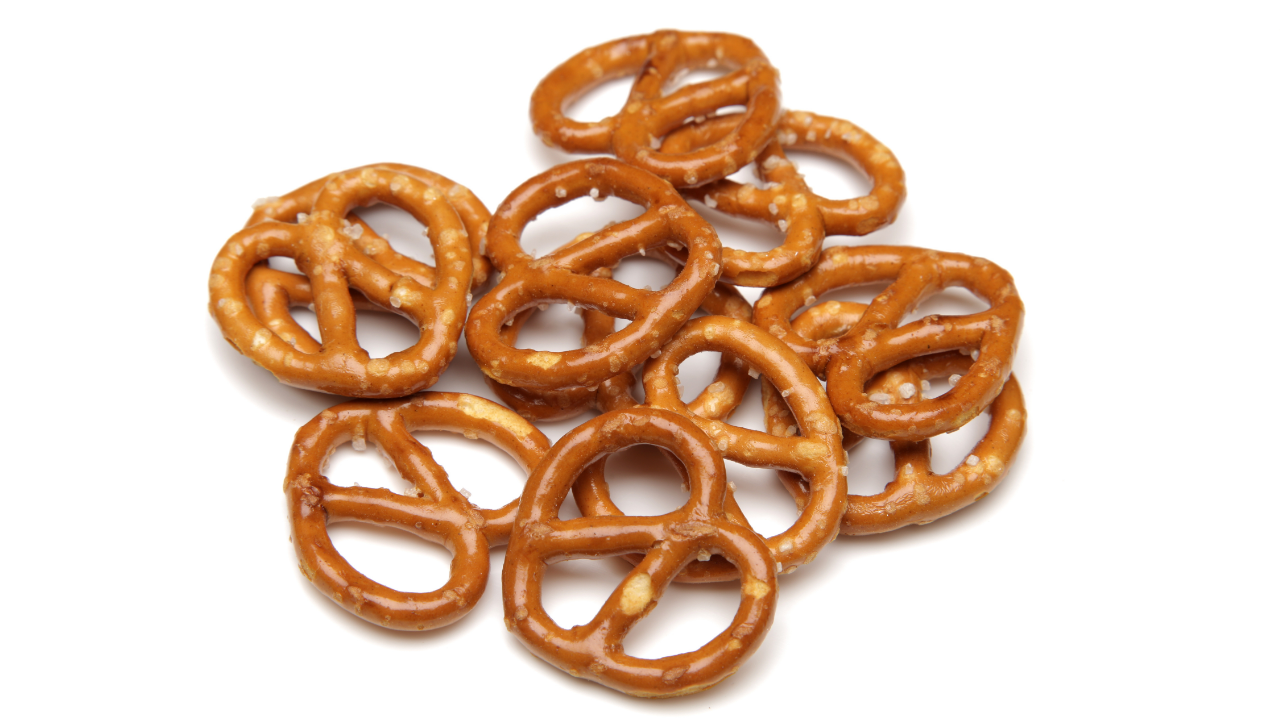Pretzels are a popular snack enjoyed by many around the world. They come in various forms, from the classic twisted shapes to sticks and nuggets, often sprinkled with coarse salt. But are pretzels good for you? Let’s explore ten reasons why pretzels can be both beneficial and potentially problematic for your health.
Are Pretzels Good for You?
1. Low in Fat
Pretzels are generally low in fat, especially compared to other snack options like chips or cookies. Traditional pretzels are typically baked, not fried, which means they contain minimal amounts of unhealthy fats. This makes them a potentially better option for those looking to reduce their fat intake.
However, the low-fat content does not necessarily mean they are free of unhealthy ingredients. Many pretzels are made with refined flour and can contain added sugars or unhealthy oils, depending on the brand and preparation method. It’s essential to read the nutrition label to understand what you’re consuming fully.
2. Low in Calories
Pretzels are relatively low in calories compared to other snack foods. A standard serving size can provide a satisfying crunch without the high calorie count found in many other snacks. This makes them an appealing choice for those who are mindful of their calorie intake.
Nonetheless, portion control is crucial. It’s easy to overeat pretzels, especially when they’re readily available in large quantities. Overindulgence can lead to consuming more calories than intended, negating the benefits of their low-calorie nature.
3. Convenient and Portable
One of the main advantages of pretzels is their convenience and portability. They are a non-perishable snack that can be easily transported and stored, making them an excellent option for on-the-go snacking.
While their convenience is a significant benefit, it also means that they can be eaten mindlessly. This can lead to overconsumption and a lack of awareness about the nutritional content being consumed, potentially leading to weight gain or other health issues.
4. Source of Carbohydrates
Pretzels are a good source of carbohydrates, which are essential for providing energy. For athletes or individuals with high energy needs, pretzels can serve as a quick and easy way to refuel.
On the flip side, the carbohydrates in pretzels come primarily from refined flour, which can cause rapid spikes in blood sugar levels. For those with insulin sensitivity or diabetes, this can be problematic, and they should consume pretzels in moderation.
5. Low in Sugar
Most pretzels are low in sugar, which is beneficial for those looking to reduce their sugar intake. This makes them a healthier alternative to many sweet snacks that can contribute to weight gain and other health issues.
However, some flavored pretzels or those coated with chocolate or yogurt can contain significant amounts of added sugars. It’s important to choose plain pretzels and be cautious of any additional toppings that might increase the sugar content.
6. Versatility in Diets
Pretzels can fit into various dietary plans due to their versatility. They can be paired with healthy dips like hummus or peanut butter, enhancing their nutritional value.
Despite their versatility, pretzels are still a processed food, and incorporating them into a balanced diet requires attention to overall nutrition. It’s essential to balance pretzels with other whole foods like fruits, vegetables, and lean proteins to maintain a well-rounded diet.
7. Sodium Content
Pretzels are known for their salty flavor, which can help satisfy cravings for salty snacks. For those who lose a lot of sodium through sweat, such as athletes, pretzels can help replenish sodium levels.
However, the high sodium content in pretzels can be a concern for many people, especially those with hypertension or cardiovascular issues. Excessive sodium intake can lead to high blood pressure and other health problems, so it’s important to monitor and moderate salt consumption.
8. Digestibility
Pretzels are generally easy to digest, making them a suitable snack for people with sensitive stomachs. Their simplicity and lack of heavy oils or fats can make them a gentle option for snacking.
Despite being easy to digest, pretzels are low in fiber, which is crucial for digestive health. Consuming too many pretzels without adequate fiber from other sources can lead to digestive issues such as constipation.
9. Gluten-Free Options
For those with gluten intolerance or celiac disease, there are gluten-free pretzel options available. These alternatives allow people with gluten sensitivities to enjoy pretzels without adverse effects.
However, it’s important to note that gluten-free does not necessarily mean healthier. Some gluten-free pretzels can be highly processed and may contain added sugars and unhealthy fats to improve flavor and texture. Always check the ingredient list and nutrition facts.
10. Potential for Customization
Pretzels offer a great base for customization. You can choose whole grain options or make homemade pretzels to control the ingredients and improve their nutritional profile.
While customization can improve the health benefits of pretzels, not everyone has the time or resources to make their own snacks. Store-bought pretzels can vary greatly in quality and nutritional content, so it’s important to choose wisely and consider making your own when possible.
Conclusion
In summary, pretzels can be a relatively healthy snack when consumed in moderation and chosen wisely. They offer benefits such as low fat and calorie content, convenience, and versatility. However, potential downsides like high sodium levels, refined carbohydrates, and the risk of overconsumption should not be overlooked. As with any snack, balancing pretzels with other nutritious foods and mindful eating practices is key to maintaining a healthy diet.

